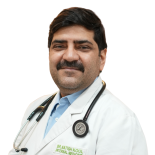About Internal Medicine
What is Internal Medicine
Often referred to as “general medicine,” internal medicine encompasses a wide range of diseases and disorders affecting multiple organ systems in the body. Internists, or internal medicine physicians, are trained to handle complex and chronic conditions affecting various organ systems. They offer comprehensive care for the people, unlike specialists who focus on a specific organ or disease. The primary distinction between internal medicine specialists and family physicians is that the former cares for only adults, while family physicians treat both children and adults.
Components of Internal Medicine
Internal medicine takes a holistic approach to the treatment of adult diseases. Its components include:
- Preventive Medicine: Internal medicine focuses on preventive healthcare to decrease the risk of chronic diseases by promoting wellness through lifestyle changes and immunizations.
- Primary Care: The specialty addresses acute and chronic health conditions through timely intervention, stabilization, and management to reduce complications and improve a patient’s quality of life.
- Subspecialty Care: There are various subspecialties within internal medicine. Subspecialists undergo additional training to develop expertise in treating specific organ systems or diseases.
- Geriatric Care: Internal medicine includes the healthcare of older people and helps manage age-related issues, chronic conditions, cognitive impairment, and functional decline through assessments, medication management, and fall prevention.
- Palliative Care: Palliative care is included in internal medicine. It includes symptom management, pain relief, and enhancing quality of life. The patients’ physical and emotional needs are handled throughout the illness.
- Research and Education: Internal medicine contributes to medical research by encouraging and facilitating clinical trials, publishing scientific papers, and advancing knowledge in various areas of internal medicine. This specialty also includes medical education and mentoring medical students.
Conditions Treated Through Internal Medicine
Internal medicine helps diagnose, manage, and treat various conditions ranging from simple to rare and complicated. They include:
- Allergies: They include allergic rhinitis, hives, and food allergies.
- Pregnancy Prevention: It includes birth control and emergency contraception.
- Cardiovascular Issues: These include hypertension, coronary artery disease, heart failure, arrhythmias (irregular heartbeats), peripheral vascular disease, pericarditis (Swelling of tissue surrounding the heart), heart defects, stroke, and transient ischemic attack (TIA).
- Endocrine Disorders: These include conditions like diabetes mellitus (Type 1 and Type 2), thyroid disorders (hypothyroidism, hyperthyroidism), adrenal disorders (such as Addison's disease), and pituitary disorders.
- Respiratory Conditions: Internists treat conditions such as asthma, chronic obstructive pulmonary disease (COPD), pneumonia, bronchitis, pulmonary fibrosis, and sleep apnea.
- Gastrointestinal Problems: These include gastroesophageal reflux disease (GERD), peptic ulcers, inflammatory bowel disease (such as Crohn’s disease and ulcerative colitis), liver diseases (such as hepatitis and cirrhosis), and pancreatitis.
- Rheumatologic Disorders: Autoimmune diseases such as rheumatoid arthritis, systemic lupus erythematosus, Sjögren’s syndrome, and vasculitis are managed by internists.
- Infectious Diseases: Internists help diagnose and treat various infectious diseases, like bacterial infections (such as urinary tract infections and pneumonia), viral infections (such as influenza and HIV/AIDS), fungal infections, and parasitic infections.
- Nephrological Complications: These include chronic kidney disease, acute kidney injury, nephrotic syndrome, glomerulonephritis, and electrolyte imbalances. Internists also treat urinary health issues, including bladder and urinary tract infections.
- Neurological and Cognitive Issues: Internists treat conditions like stroke, dementia, Alzheimer’s disease, Parkinson’s disease, multiple sclerosis, epilepsy, cognitive impairment, peripheral neuropathy (damaged nerves), migraine, Bell’s palsy, meningitis, encephalitis (inflammation of the brain), neuromuscular diseases like Myasthenia Gravis, etc.
- Hematological Disorders: They include anemia, clotting disorders (deep vein thrombosis and pulmonary embolism), bleeding disorders (hemophilia), and blood cancers (leukemia, lymphoma, and multiple myeloma).
- Oncological Problems: Internists help manage various cancers, collaborating with oncologists to diagnose, treat, and provide supportive care for cancer patients.
- Psychiatric Disorders: Internists treat common mental health conditions, such as depression, anxiety disorders, bipolar disorder, substance abuse disorders, and cognitive impairment.
- Geriatric Syndromes: Internists treat conditions such as frailty, falls, polypharmacy, cognitive impairment, and end-of-life care in elderly patients.
- Dermatological Issues: These include abscesses, cysts, cellulitis, skin cancer, and acne.
- Ear, Nose, and Throat (ENT) Problems: These include problems like sinusitis, pharyngitis, rhinitis, strep throat, and vertigo.
- Gender-Specific Health Issues: Internists help treat prostate disease, erectile dysfunction, and obstetric and gynecological problems.
- Metabolic Complications: These include metabolic alkalosis, metabolic acidosis, and metabolic mineral and bone diseases.
- Orthopedic Issues: These include strains, sprains, fractures, and minor injuries, along with pain and inflammation in the joints. Acute and chronic pain and pain related to cancer and other medical problems are also treated.
Sub-Specialities of Internal Medicine
- Cardiology
- Allergy and Immunology
- Critical care for multiple organ failure
- Endocrinology (diabetes and other metabolic and glandular disorders)
- Gastroenterology (gastrointestinal system, liver, and gallbladder)
- Hematology (blood)
- Infectious and inflammatory diseases
- Nephrology (kidneys)
- Oncology (cancer)
- Pulmonology (lungs and respiratory system)
- Rheumatology (joints and musculoskeletal system)
- Hepatology (liver)
Diagnosis and Treatment Protocol of Internal Medicine
- Patient Evaluation: Collecting detailed history and conducting a thorough physical examination
- Diagnostic Testing: Prescribing tests based on symptoms
- Diagnosis: Considering potential causes and ruling them out step by step
- Treatment: Developing a personalized treatment module for symptomatic relief and disease control
- Medication: Prescribing medicines based on their efficacy and safety
- Lifestyle Changes: Advising modifications in the diet, exercise, and habits
- Patient Education: Informing patients regarding their ailment, therapeutic alternatives, and self-care
- Follow-Up: Regularly monitoring progress and reviewing treatment
- Coordination: Collaborating with other healthcare teams for optimum patient care
Internal medicine is a dynamic and essential specialty that takes care of the diverse healthcare needs of adults across their lifespans. Fortis, with its team of highly skilled and experienced Internists, is a frontline provider of comprehensive and personalized medical care to patients with a wide range of conditions.
Our Team of Experts
View allMedical Procedures for Internal Medicine
View allOur patient’s stories
View allRelated Specialities
Other Specialities
-
Explore Hospitals for Internal Medicine
Fortis Escorts Heart Institute, New Delhi Fortis Escorts Hospital, Amritsar Fortis Escorts Hospital, Faridabad Fortis Escorts Hospital, Jaipur Fortis Flt. Lt. Rajan Dhall Hospital, Vasant Kunj Fortis Hospital - Greater Noida Fortis Hospital & Kidney Institute, Gariahat, Kolkata Fortis Hospital BG Road Bangalore Fortis Hospital CG Road Bangalore Fortis Hospital, Anandpur, Kolkata Fortis Hospital, Kalyan, Mumbai Fortis Hospital, Ludhiana Fortis Hospital, Mohali Fortis Hospital, Mulund, Mumbai Fortis Hospital, Noida Fortis Hospital, Rajajinagar, Bengaluru Fortis Hospital, Richmond Road, Bengaluru Fortis Hospital, Shalimar Bagh, New Delhi Fortis La Femme, Greater Kailash II, New Delhi Fortis CDOC, Chirag Enclave, New Delhi Fortis Memorial Research Institute, Gurgaon Fortis Nagarbhavi Bangalore Hiranandani Fortis Hospital, Vashi, Mumbai Fortis Hospital Mall Road, Ludhiana Fortis Hospital, Manesar, Gurugram -
Explore Doctors for Internal Medicine by Hospital
Doctors in Fortis Escorts Heart Institute, New Delhi Doctors in Fortis Escorts Hospital, Amritsar Doctors in Fortis Escorts Hospital, Faridabad Doctors in Fortis Escorts Hospital, Jaipur Doctors in Fortis Flt. Lt. Rajan Dhall Hospital, Vasant Kunj Doctors in Fortis Hospital - Greater Noida Doctors in Fortis Hospital & Kidney Institute, Gariahat, Kolkata Doctors in Fortis Hospital BG Road Bangalore Doctors in Fortis Hospital CG Road Bangalore Doctors in Fortis Hospital, Anandpur, Kolkata Doctors in Fortis Hospital, Kalyan, Mumbai Doctors in Fortis Hospital, Ludhiana Doctors in Fortis Hospital, Mohali Doctors in Fortis Hospital, Mulund, Mumbai Doctors in Fortis Hospital, Noida Doctors in Fortis Hospital, Rajajinagar, Bengaluru Doctors in Fortis Hospital, Richmond Road, Bengaluru Doctors in Fortis Hospital, Shalimar Bagh, New Delhi Doctors in Fortis La Femme, Greater Kailash II, New Delhi Doctors in Fortis CDOC, Chirag Enclave, New Delhi Doctors in Fortis Memorial Research Institute, Gurgaon Doctors in Fortis Nagarbhavi Bangalore Doctors in Hiranandani Fortis Hospital, Vashi, Mumbai Doctors in Fortis Hospital Mall Road, Ludhiana Doctors in Fortis Hospital, Manesar, Gurugram


























